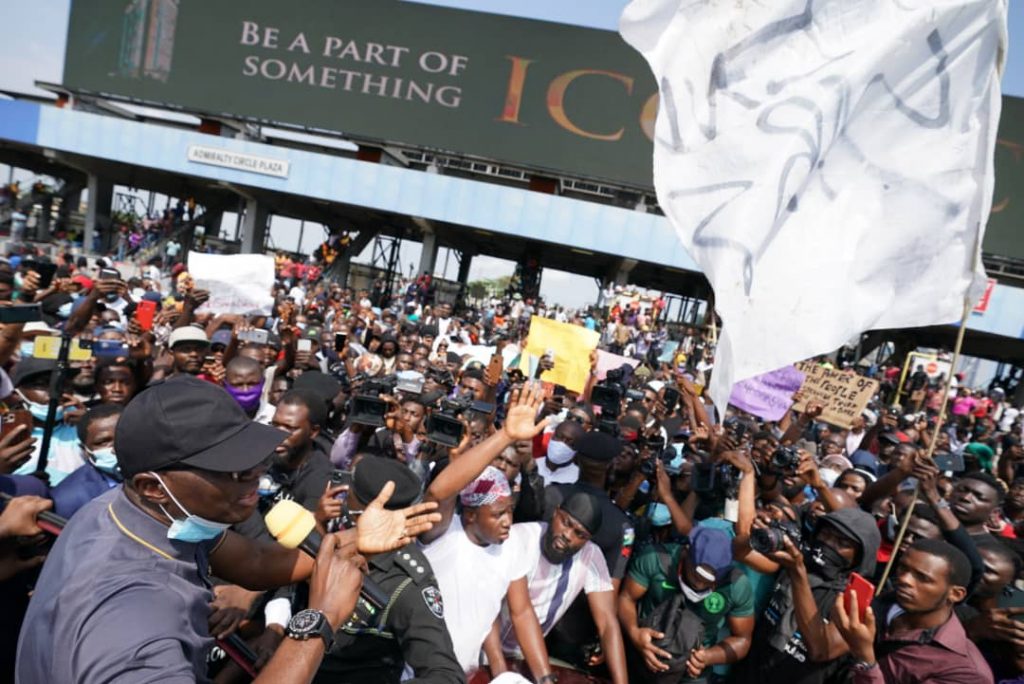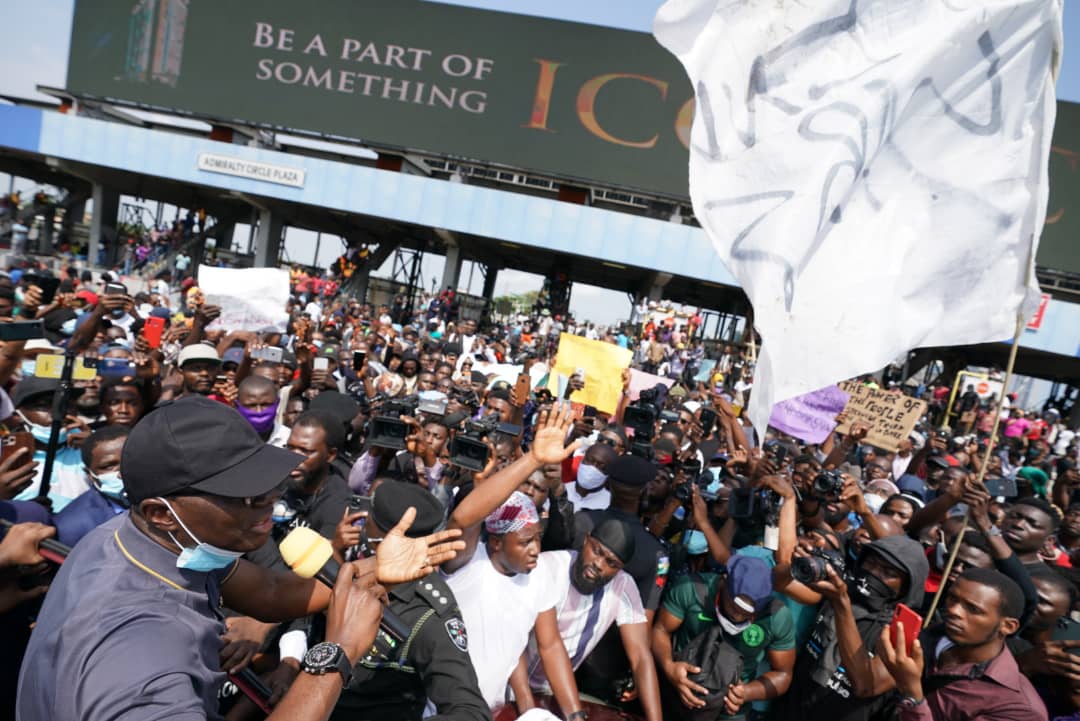The End SARS protests had again brought into the fore the urgent need for the government to re-examine how far they have gone in attaining the Sustainable Development Goals, SDGs. The 17 goals and 169 targets of the SDGs represent a global consensus recognizing both the achievements and inadequacies of the Millennium Development Goals, (MDGs) and emerging development challenges and aspirations. The SDGs present a strong commitment by both developed and developing countries to end extreme poverty and hunger, reducing inequalities and promoting inclusive growth.
Goal 1 of the SDGs was designed to end poverty by the year 2030. Goal 2 of the SDGs was targeted to end hunger by 2030 and ensure access by all people in particular the poor and the people in vulnerable situations including infants, to safe, nutritious and sufficient food all year round.
Goal 7, talked about by year 2030 to ensure universal access to affordable, reliable and modern energy services. Goal 9 was about developing quality, reliable, sustainable and reliable infrastructure, including regional and trans-border infrastructure, for support economic development and human wellbeing, with a focus on affordable and equitable access for all.
Goal 11 was meant to ensure for all adequate, safe and affordable housing and basic services, and upgrade slums by 2030.
Goal 16 was meant to significantly reduce all forms of violence and related death rates everywhere.
These are some of the important issues of development that were targeted in the SDGs agenda for sustainable development.
From what happened during the End SARS protests in the last two weeks in the country, it is clear that our government is not paying enough attention to SDGs the way other countries are addressing it with passion.
Many of the youths are still left out in the poverty alleviation programmes of the government. The government could still do more to end poverty in Nigeria.
Why did the protest against police brutality AKA “EndSARS Protests” turned bloody in Lagos and other parts of Nigeria? Why did hoodlums hijack the protest to begin attacking innocent citizens? What led to the burning of BRT buses in Lagos and looting of banks, court, shopping malls etc?
“It became very clear very quickly that the protest cannot just be about an end to the Special Anti-Robbery Squad (SARS), because the kind of abuses that are documented with SARS squad are also something that has become part of everyday life of Nigerians in their contact with figures of authority across the board,” Annie Olaloku-Teriba, Nigerian affairs analyst, told Al Jazeera.
“The gross inequality, which we’ve seen, has meant that the young people going out on streets feel like it is a fight for survival.”
Olaloku-Teriba said “the government’s response has just been to use water cannon and open fire on protesters and they [demonstrators] are experiencing that brutality which is only making the demands of the protests broaden.”
Despite massive oil wealth and one of Africa’s largest economies, Nigeria’s people have high levels of poverty and lack of basic services, as a result of rampant corruption, charge rights groups.
On Tuesday, former US Secretary of State Hillary Clinton called on President Buhari and the Nigerian army “to stop killing” protesters.
Nobel Prize winner Wole Soyinka told Sky News the atmosphere in the city was “very, very dark, very ominous”.
He said he had seen lots of evidence and testimony from witnesses who said the government was responsible for the shootings.
Demonstrations and gunfire were also reported in several other Nigerian cities, including Abuja.
One man told Sky News: “The army killed people, they have killed innocent protestors and it’s unacceptable.”
Before the shootings in Lekki, a Nigerian police statement warned that security forces would now “exercise the full powers of the law to prevent any further attempt on lives and property of citizens”.
Speaking in a televised address, Lagos State governor Mr Babajide Sanwo-Olu said he has ordered an investigation into the actions of the military.
Nigeria is said to be the poverty capital of the world. That is why many young Nigerians had been protesting for over two weeks across the country.
Over 70% of the population is under 30 years of age. Unemployment stood at 21.7 million in the second quarter of 2020. The youth account for 13.9 million of this.
Young Nigerians are, therefore, most affected by government policies that have led to a lack of jobs and meaningful sources for livelihood. Other triggers include the lavish lifestyle of political leaders. The government budgets more money for the members of the National Assembly than for health and education. This is against the tenets of SDGs.
One takeaway is that a new social contract is being written. Nigerians are creating a new understanding of how leaders and public servants should relate to citizens.
Secondly, the youth are reinventing governance in Nigeria and bringing about a new culture of asserting rights among the citizenry.
The 30% of Nigerian who are adults and have experienced military rule seem to have that etched deep into their psyche. They are afraid of a man in uniform. This has become a part of Nigerians’ conditioning.
However, the youth believe that the men in uniform are meant to serve the citizens and to protect them. It is a different relationship entirely. Young people are more exposed to the fact that things could be better and are ready to take their destiny into their own hands. They want to reinvent the country and to be a better place to live.
Their access to the internet also informs their action. They are able to reach the world from their bedroom.
For many years, Nigeria has been ruled by leaders who are quite elderly. These have not succeeded in finding solutions to the nation’s challenges. Corruption and hunger are rife. It is obvious that young Nigerians feel alienated and are now ready to take the bull by the horns and ensure good governance.
Politicians and leaders are waking up to a new politically conscious society. According to the Chairman Nigeria’s Governors, Dr. Kayode Fayemi of Ekiti State:
“There is nothing wrong in what the young people are doing. I think we should encourage them to ask more questions.”
Various state governments are beginning to see how important it is to have a good relationship with young people. Given the awakening of this new political consciousness, it will not be business as usual for the country’s political leaders.
SARS was a special police unit set up decades ago as Nigeria battled rising levels of crime and kidnappings.
Initially, it was successful in reducing cases of violent crime but more recently the unit had been “turned into banditry”.
In June 2020, Amnesty International released a report that documented at least 82 cases of torture, ill-treatment and extrajudicial execution by SARS between January 2017 and May 2020.
The protests were sparked by a viral video allegedly showing SARS officers killing a young man in the southern Delta state. Authorities denied the video was real.
The man who filmed the video was arrested, provoking even more anger.
With the demonstrations against SARS growing in size, the government on October 11 was forced to dissolve the controversial unit on October 11.
“The disbanding of SARS is only the first step in our commitment to extensive police reform in order to ensure that the primary duty of the police and other law enforcement agencies remains the protection of lives and livelihood of our people,” President Muhammadu Buhari said.
Authorities later ordered all personnel to report to the police headquarters in the capital, Abuja, for debriefing and psychological and medical examination. Meanwhile, the forming of a new Special Weapons and Tactics (SWAT) team was announced to replace SARS.
However, the announcements did not satisfy protesters, who viewed them as just another renaming exercise and pledged to stay on the streets until their demands are met.
These include the immediate release of all arrested protesters; justice for all deceased victims of brutality; and appropriate compensation for their families.
Protesters also call for an independent body to oversee the investigation and persecution of all reports of police misconduct; psychological evaluation and retraining of all disbanded SARS officers before they can be redeployed,; and an increase in police salary so they are adequately compensated for protecting the lives and property of the citizens.
Many are also calling for more wide-sweeping change in Nigeria, which has the largest number of people living in extreme poverty in the world and a massive youth unemployment rate.
The government should use the occasion to examine the SDGs and see what more can be done to end poverty in Nigeria. We should take a cue from how hoodlums hijacked what ought to be a peaceful protest to a bloody one to end hunger and poverty in Nigeria. We are still far behind the journey to end poverty by 2030.


